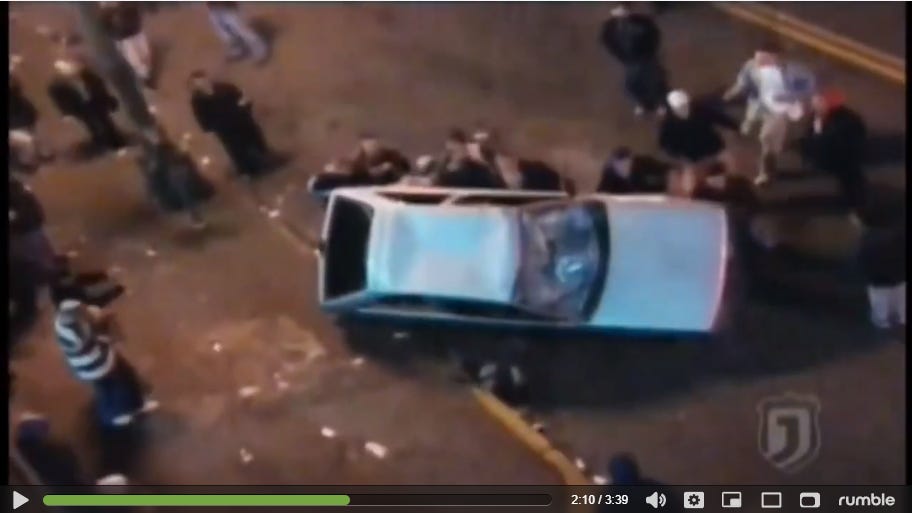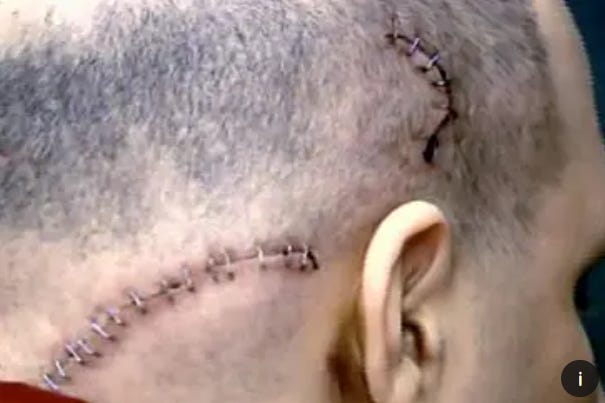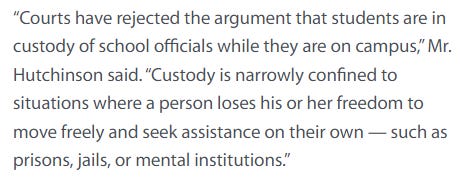(Apologies for both the lack of recent content and the abundance of content in this article — it’s taken a while to put together, but is extremely important!)
It shames me to admit it — even after my initial (and continuing) reasons to be suspicious of authority from a young age, I lived well into my freewheeling 20s before I REALLY learned one of the most basic rules about living in America.
Looking back, I probably should have known better — after all, I listened to “dangerous, subversive” music that chronicled the experiences of young black men living in Southern California. Many of these songs explicitly (and EXPLICITLY) told me that police were not to be trusted.
“But that’s in California — and these guys are admitted criminals,” I thought to myself. Obviously the police around HERE are always upstanding community members who are uniformly helpful and brave — the kind of people who will jump into harm’s way to protect the public. I thought that when the chips were down, “Protect and Serve” was the underlying tenet of police work. (Little did I know, back then, that this was just a motto.)
Reality hit me square in the jaw sometime around 2005, when I ran into an old high school buddy at a party. When I asked him what he had been up to, he told me that most of his recent days were spent in a legal battle with the city of Seattle.
It turns out my friend was in Pioneer Square during the Mardi Gras Riots of 2001. As I recall, these riots weren’t huge news outside the northwest, but it was very much AN EVENT around my parts. The Cliffs Notes version is that early in the holiday weekend, small-scale rioting took place in the streets, with the Seattle PD wading into the (drunken) crowd to maintain order. However, faced with a much larger crowd on Fat Tuesday (the climax of Mardi Gras), the police force changed its tactics:
This turned out to be a huge mistake. Allowed to run free in the streets, emboldened rioters smashed windows, overturned cars, set fires — and started attacking people seemingly at random. Take a look at some video of the incident from “Most Shocking”:
My buddy’s story sounded extremely similar to Chris Shirley’s — he witnessed an act of violence and tried to break it up, only to have the mob turn and attack him instead. And while this was all happening in plain view of police officers, they just sat by and watched. (Just following orders!)
Obviously a little bit miffed about the experience (and with considerable hospital bills), my friend explained to me that a handful of people who suffered injuries — including Chris Shirley, it turns out — sued the city for not intervening in the riot. And what he said next blew my already-wasted mind: They lost the case because the police have no duty to protect you. (At the time, they were appealing the decision, but they also lost there.)
“Wait, the police don’t have to protect you?”
“Nope.”
“What the FUCK!”
“Yep.”
When I sobered up enough to Metacrawler some relevant case law, what I found was absolutely shocking.
I started with Warren v. District of Columbia, a case in which Miriam Douglas was awakened by intruders breaking into her rooming house. The perpetrators (Marvin Kent and James Morse) barged into the second-floor bedroom occupied by Douglas, where she was forced to perform fellatio on Marvin Kent and was raped by James Morse. Hearing Douglas scream, upstairs neighbors Carolyn Warren and Joan Taliaferro called 9-1-1 and informed the police that a burglary was in progress and to send officers as quickly as possible — they then climbed out onto the roof, where they watched as officers half-heartedly “investigated” for five whole minutes and left after nobody answered the door.
Warren and Taliaferro snuck back inside and phoned police again, who assured them officers were on the way. But no officers ever came, and when Morse and Kent figured out that Warren and Taliaferro were in the house, the men forced all three women back to Marvin Kent’s apartment. There, the women were robbed, raped, and beaten for FOURTEEN HOURS.
Yet when the women sued the city, the court ruled "the duty to provide public services is owed to the public at large, and, absent a special relationship between the police and an individual, no specific legal duty exists". Calling the police — twice — and informing them of a crime in progress wasn’t enough to create “a special relationship between the police and an individual” (more on that later), and therefore police had no duty to intervene.
A cynical person might point out that police can’t provide services to the public at large without providing those services to individuals who make up the public at large. (Imagine the fire department stating they don’t need to put out YOUR house fire because they service the “public at large”.)
An especially cynical person might think this is another classic example of “Fuck you, that’s why” that creates the foundation of law-as-it-pertains-to-government.
I would agree with both of those people.
So what DOES count as a “special relationship” with the police that requires them to come to your aid? What about a restraining order — say, against your psychotic estranged husband? What if that restraining order specifically stated that police SHALL arrest the offending party?
This was the case in Castle Rock v Gonzales. While going through a nasty divorce proceeding, Jessica Gonzales asked for and received a restraining order against her stalker husband Simon.
Roughly two weeks later, Simon violated this restraining order and took the couple’s three children from Jessica’s front yard. Jessica called the police to notify them of the situation at 7:30 PM (during that call, the police told her to wait until 10 PM and call back), 8:30 PM (again, the police told her to wait until 10 PM), 10:10 PM (this time, the police told her to wait until midnight), and — after going to Simon’s apartment and finding nobody home — 12:15 AM (the police this time told Jessica to wait at the apartment for an officer. Nobody arrived.) After waiting for help that never showed up, she went in person at the police station at 12:40 AM.
Police still refused to take action, regardless of the wording of the restraining order.
A few hours later, Simon showed up at the Castle Rock police station and got into a gunfight with officers. Simon was killed in the shootout, but more horrifying than his actions at the police station is what law enforcement discovered when they searched his truck — the dead bodies of the three missing children.
So let’s recap quickly: the State of Colorado issued a restraining order against Simon. Jessica informed the Castle Rock police MULTIPLE TIMES that Simon was violating the order. Despite the “SHALL ARREST” wording of the restraining order, police took no action against Simon. But SURELY the restraining order creates the “special relationship” that creates the duty for police to intervene, right?
Wrong.
Even when the state promised to take action against her husband for violating the restraining order, police had no duty to protect Jessica or her children.
Somehow it gets worse.
What if the entire city’s police force is actively looking for a drugged-out murderer? What if that murderer gets on a subway car AND THE POLICE ARE ON THE TRAIN? What if that murderer actually interacted with the cops before going on yet another rampage — in plain view of the police?
These are the facts in Lozito v. New York. Early in 2011, Maksim Gelman boarded a subway having already killed four people in a 28-hour murder spree. Police officers Terrance Howell and Tamara Taylor were stationed in the operator’s cab SPECIFICALLY LOOKING for Gelman — who at one point demanded to be allowed into that very operator’s cab, with Gelman stating that he was a police officer. (This didn’t raise the suspicions of the actual cops Gelman was interacting with.)
The officers ignored Gelman — who then wandered into another car — as well as a bystander who recognized the target of the manhunt and attempted to alert the cops. Gelman then returned to the scene, told subway rider Joseph Lozito “You’re going to die,” then stabbed him in the face. Quickly fighting back, Lozito ended up pinning Gelman to the floor and disarming him — an action that was not without consequences:
Once the threat had been neutralized and it was safe, the officers emerged from the operator’s cab and took control of the situation.
Is this starting to sound familiar yet? Even when the police are present and are actively looking for the person who’s stabbing you in the face, they have no duty to stop that person from stabbing you in the face.
Somehow, it gets EVEN WORSE.
All states require some form of compulsory education. This means that it’s ILLEGAL for kids to NOT be in school. (Some readers may recall Kamala Harris bragging about sending subordinates to threaten parents with jail time if their kids missed school.)
So when the state is forcing your child to attend school, surely THAT creates a “special relationship” with police that requires them to protect children, right?
In a sane world, you would be correct. In our world, we have two recent high-profile cases in which the opposite is reaffirmed.
First, we recall the tragic shooting at Marjory Stoneman Douglas High School in Parkland, Florida. When known troublemaker and expelled student Nikolas Cruz showed up on campus and started shooting, Broward Sheriff's deputy school resource officer Scot Peterson — the only other armed person on campus — cowered outside and waited for backup.
Four minutes and 17 bodies later, Cruz stopped his assault, blended in with the panicking crowd, and left campus. Peterson hid for 45 minutes. By now you shouldn’t be surprised at what happened in the subsequent lawsuit filed by 15 students:
Uvalde, Texas provides another crystal-clear example. In this case, police stood outside an elementary school classroom for nearly 90 minutes while Salvador Ramos was in the process of killing 19 children and two teachers. While frantic kids called 9-1-1 and begged the police to save them, the cops milled about and did nothing — even when they heard gunshots behind the door.
This lack of action infuriated the country, and for good reason.
But some of us weren’t surprised when we read about the cops’ legal duty to intervene in the killing:
Morally, those cops should have been in the room nearly immediately. (The parents sure would have been — if the cops hadn’t stopped them.) Legally, they could have sat outside that classroom for another 50 hours.
University of Florida School of Law professor Darren Hutchinson explains:
So even though the state forces your children to be in school, it maintains that it has no duty to keep those children safe. When tragedy strikes, the government investigates the government and finds the government did nothing wrong.
Standard.
It’s only been a month or so since the incident in which Daniel Penny choked Jordan Neely to death on a subway car, and since then we’ve heard a specific half of the population demanding that American citizens “let the police do their jobs” (while actively attempting to defund those same police).
It’s vitally important that EVERY SINGLE AMERICAN understand that “the police doing their jobs” does NOT include keeping you safe or intervening when you’re in danger.
It doesn’t matter if they’ve promised to help you in writing.
It doesn’t matter if they’re actively looking for the person attacking you.
It doesn’t matter if they’re standing right next to you when you’re attacked.
Police have no duty to protect you.
This is not some “Ultra MAGA Second Amendment fantasy”, it’s settled law.
For this reason (and many others), it’s EXTREMELY dangerous to “outsource” protection of you and your family. When push comes to shove, keeping yourself — and your family — safe is YOUR duty, and no one else’s.
Take this duty seriously. Train with and carry whatever protection you feel is necessary. Don’t assume that police will swoop in and save the day, even if they’re standing right next to you.
Being prepared — and knowledgeable about the law — could be the difference between a scary situation and a fatal one.











A thoughtful comment from walter53a@duck.com, who's clearly too stupid to figure out the comment section:
Eat shit
--------
Thank you for your contribution to our community!
I'm confused by your logic.
So this is why we need to fund the police more and not less?
I think the history of these court cases, alongside Jordan Neely's mental health issues, proves that we need to put more money towards mental health and not more towards police.
Your afterthought seems contradictory to the cases you were explaining.